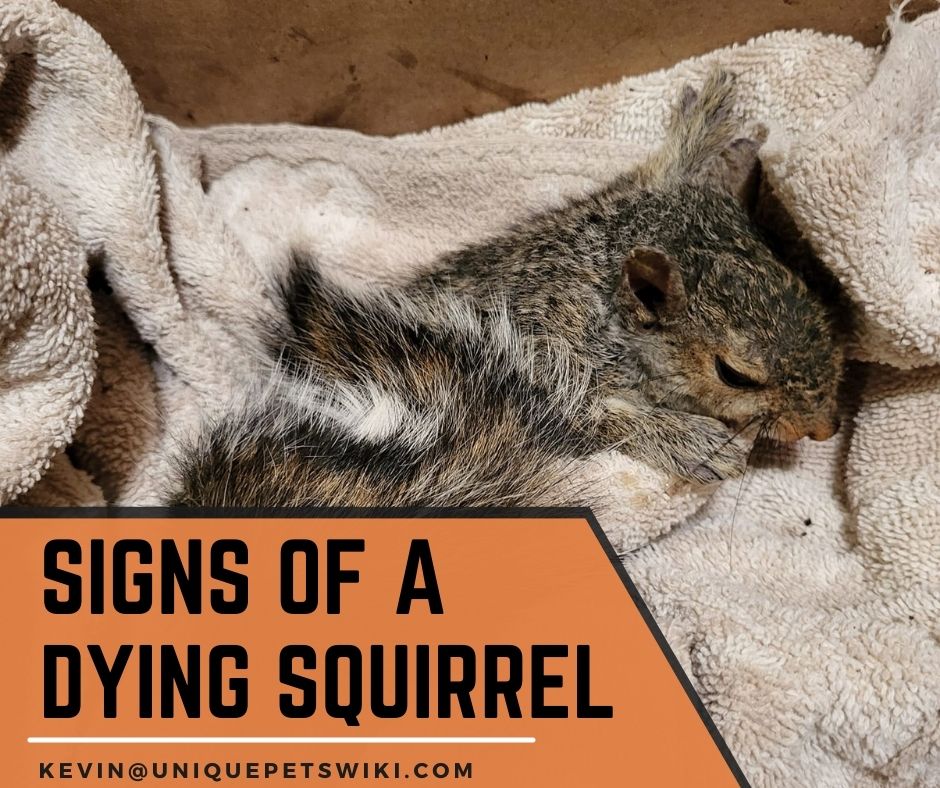Suspecting that your squirrel is dying or showing signs of ailment? A healthy squirrel is popularly known for its healthy-looking fur, perky nature, and high level of speed, precision, and energy.
However, it may be hard for some people to determine whether their squirrel is sick. This is because squirrels can carry disease and may not show any visible symptoms. Noticing any changes in your squirrel’s appearance and behavior can help to show that your squirrel is not healthy.
In this article, we will highlight how you can discover whether your squirrel is dying and how you can treat your squirrel at home.
This article has been reviewed and consulted by Dr. Linda. Read more about our knowledge control process here.
Contents
9 Signs to Tell If a Squirrel Is Dying
Squirrels are susceptible to a wide range of diseases.
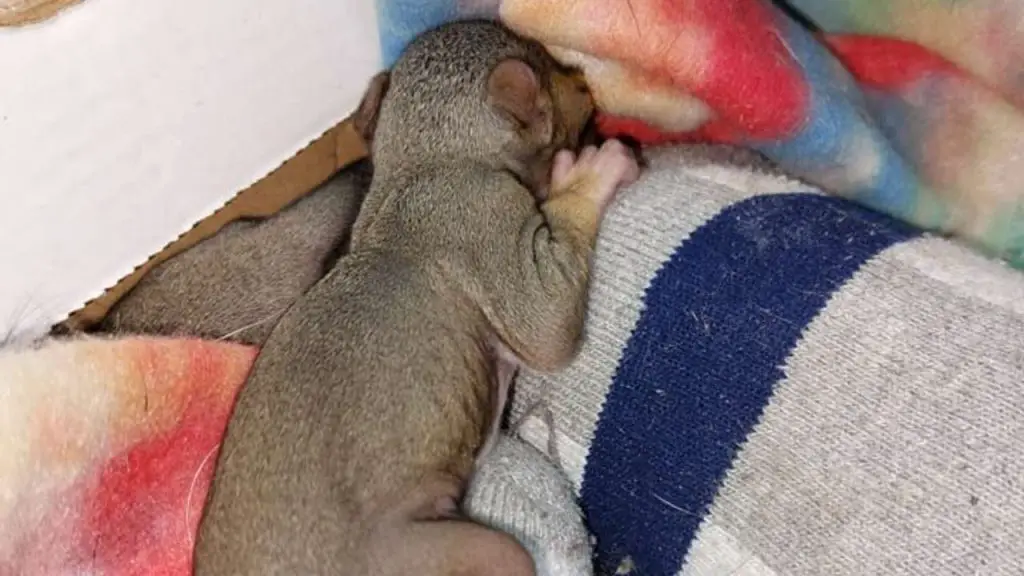
However, some squirrels can easily carry the disease for a long time without showing any visible symptoms. Some of the signs that you can watch out for to help detect whether your squirrel is dying are stated below.
- Spasms or seizures
- Discharge from their eyes, mouth, or nose
- Wheezing, coughing, or sneezing
- Lesions or rashes
- Lethargic behavior or weakness
- Visible tumors
- Skin abnormalities like bare skin or spots.
- Passing blood or diarrhea
- Injury
Do Squirrels Die Of Old Age?
Squirrels can live up to 12 years as pets, but, like other animals, squirrels still die of old age. Some squirrels can live more than squirrels’ average lifespan but they will naturally die after certain number of years.
It’s better to prepare to say good buy to your buddy before he suddenly passed away.
How to Tell If Your Squirrel is Sick?
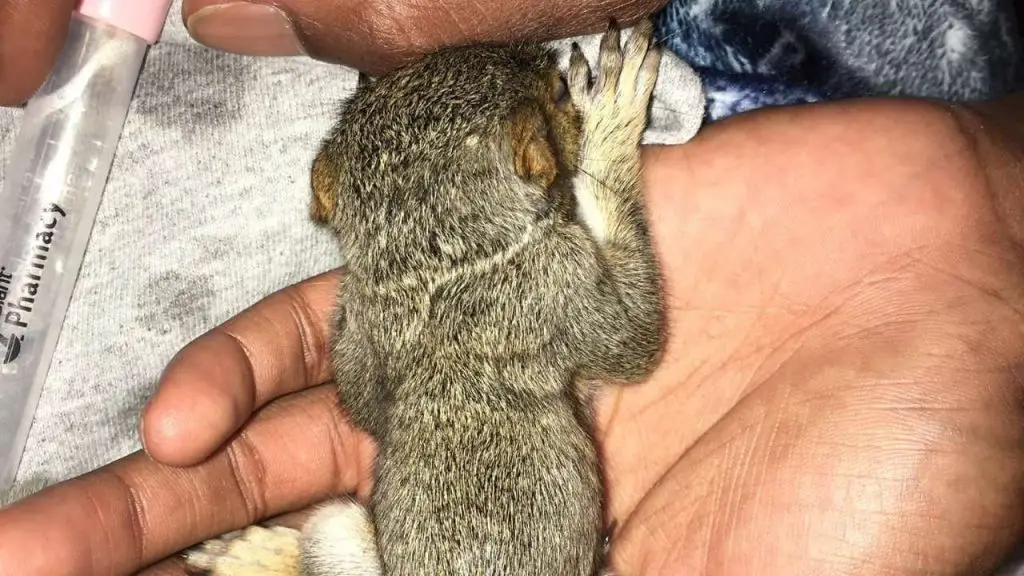
Some of the common symptoms that you can use to detect if your squirrel is sick are the changes in their behavior such as weakness, baldness and spots on their skin, and also visible tumors.
Some of the common signs of sickness in squirrels are:
- Lethargic Behavior And Weakness
- Loss Of Appetite
- Skin Conditions Or Abnormalities
- Loss Of Weight
Lethargic Behavior and Weakness
A healthy squirrel is known for its high level of speed, energy, and precision. However, lethargic behavior and weakness usually indicate that your squirrel is sick.
A lethargic behavior symptom can indicate that it is suffering from diseases like rabies to the bubonic plague or internal organ infection.
Once this happens, it is best if you stay away and seek expert help immediately.
Loss of Appetite
This is one of the most obvious ways that you can tell that something is wrong with your squirrel.
This is because squirrels always have a high appetite and can easily eat just about anything. Furthermore, they are omnivores and will eat anything that looks delicious to them.
However, when you notice that your squirrel is disinterested in any food that you put in their tank, you should take them to the vet immediately.
Skin Conditions or Abnormalities
If you notice that your squirrel is suffering from any skin conditions like baldness, bare skin showing spots, or tumors then it indicates that it is suffering from some type of skin disease.
Furthermore, squirrels that suffer from bacterial and fungal infections may have hair loss and dark patches on their skin.
When there are tumors on the skin of your squirrel, then it may be suffering from squirrel pox.
Loss of Weight

Loss of weight can be a tricky way to determine if your squirrel is sick. This is because it is interconnected with several signs such as loss of appetite, lethargy, etc.
Your squirrel will surely lose weight if it does not eat. Furthermore, once it loses weight, it will become lethargic and weak.
However, once your squirrel starts to show weight loss symptoms, it may be too late as it has become too weak to even fight off the ailment.
Once you notice that your squirrel is losing weight, you should rush it to an exotic vet immediately for treatment.
Can You Treat A Sick Squirrel?
There are some squirrel illnesses that can be easily treated at home. Some of them are stated below.
The Ill Symptoms That You Can Treat At Home
Some illness symptoms in squirrels can easily be treated at home such as MBD, squirrel pox, encephalomyocarditis, and injury.
Metabolic Bone Disease
Metabolic bone disease is a common illness in captive squirrels that are not getting sufficient natural light.
Furthermore, squirrels can develop MBD if they are suffering from a poor diet, especially that lack of Vitamin in their nutrient. Some of the symptoms of metabolic bone disease in Squirrels are lethargy and pain.
You can easily treat squirrels with a metabolic bone disease by providing your squirrels with about 20 minutes of direct sunlight per day, supplementing calcium, or by using full-spectrum light bulbs in their cage.
Squirrel Pox
Squirrel pox is also called squirrel fibroma and it leads to the growth of tumors on the epidermis of your squirrel. The tumors may also metastasize into serious tumor that affects their internal organs.
Squirrel pox is usually more vulnerable to young squirrels and it is transmitted virally which can be from mosquitoes or fleas or from a squirrel.
There is no known cure for squirrel pox and you can only try to prevent the spread by quarantining the affected squirrel.
Comments from Dr.Linda
Although this is the last thing we want, affected animals should be euthanised to prevent suffering.
Encephalomyocarditis
This is a viral illness that leads to the inflammation and degeneration of the heart and skeletal tissue and then destroys the nervous system of the squirrel.
Encephalomyocarditis can be transmitted by contact with infected rodents or through secondary virus transmission.
Some of the symptoms of encephalomyocarditis are elevated heart rate, blisters, respiratory problems, and lack of motor function. They will die from viral encephalomyocarditis, and sudden death is the most common sign.
Injury
The common cause of injury in squirrels is when they fall from trees. You can treat minor injuries like bites, cuts, or scratches with patience and care. All you have to do is clean the injury with a saline solution of table salt and water.
You can also treat any wounds with a small amount of Germolene, Savlon, and other similar antiseptics (not disinfectants).
There are situations when flies will lay eggs on the wound. You will need to remove all the eggs immediately with a pair of tweezers or else they will hatch into maggots and cause more problems.
Dehydration
Squirrels need water for digestion and if the body’s reserves are depleted, the other body functions will suffer from it. You can detect if your squirrel is dehydrated by checking whether its nose is moist or the mouth is wet.
You can also use a pinch test. In this method, you will fold the skin on the back of your squirrel’s neck to raise it. Once released, the skin should return to normal immediately. If your squirrel is dehydrated, you can buy a powder known as Lectade from the Vet that will help with dehydration.
You will then mix the powder with water and administer it orally with a pipette. You can also use the International Rehydration Solution which comprises of
- Half a teaspoonful of salt
- Half a liter of water
- Half a tablespoonful of glucose or sugar.
You will then stir until the salt and sugar are dissolved and then administer it to your squirrel lukewarm. Once the dehydration lasts for more than 12 hours or refuses to drink it, it is best to take your squirrel to the Vet to help administer a rehydration solution subcutaneously.
Shock
It can be hard to diagnose that your squirrel is in shock. Once you notice that your squirrel is suffering from shock, you should try to offer it warmth, darkness, quietness, and shelter for a while. This is unless your squirrel needs emergency veterinary care.
However, you can also administer a couple of drops of Bach’s Rescue Remedy to your squirrel if it will take it. It is advisable to take a squirrel that cannot or refuse to take food or drink to the Vet.
When Do You Need A Vet?
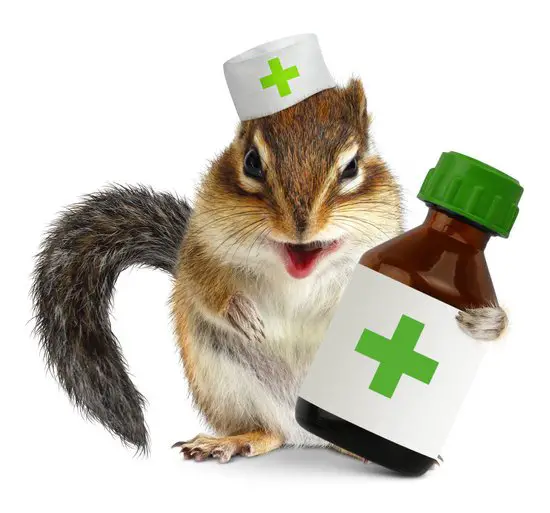
Squirrels are susceptible to a wide range of diseases; they are also more exposed to environmental threats than humans. The best thing to do once you notice that your squirrel is sick is to take it to an exotic veterinarian.
At the Vet office, you should try to provide enough detail about your squirrel including the feeding habits and living conditions. This can help the vet to determine the cause of the ailment. They will then help to suggest ways you can improve their living conditions after the treatment.
Once your squirrel is treated by the vet, you can then provide good supportive care until it recovers completely.
How to Tell and Save A Baby Squirrel From Dying?
You may find baby squirrels on the ground and be wondering whether it is healthy or not. You may be wondering how you can detect whether a squirrel is dying and the things you can do to help save its life.
However, a healthy baby squirrel is usually pink, fat, and will squirm when touch them. That’s normal apperance, what about abnormal one? We will break down the signs that you can look out for to help detect whether a baby squirrel is dying and how you can save them.
How to Tell If a Baby Squirrel Is Dying?
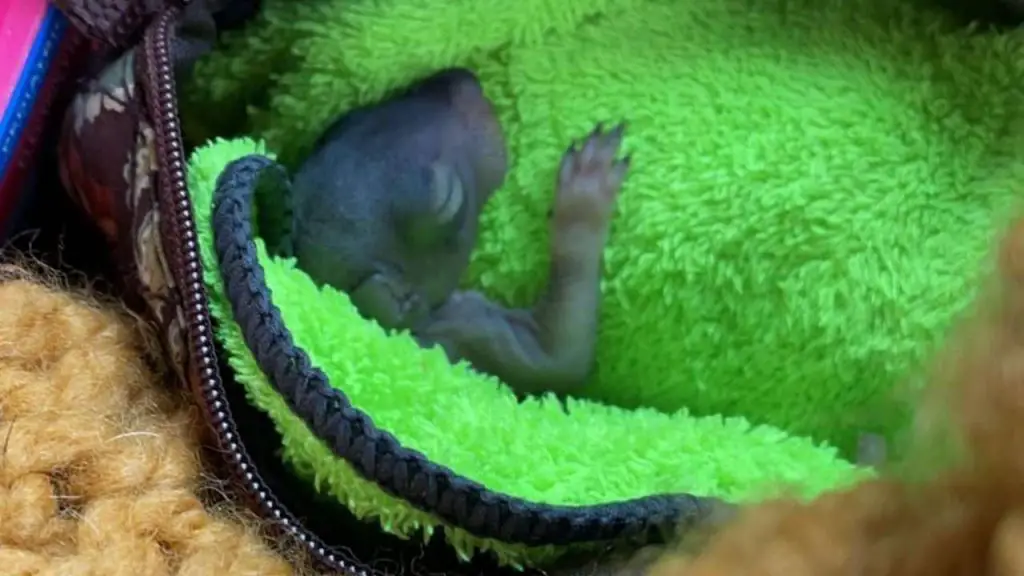
Baby squirrels are susceptible to a plethora of diseases that can affect their lifespan. Some common symptoms that can help determine if a baby squirrel is dying are stated below.
- Discharge from their mouth, eyes, or nose
- Seizures
- Lesions or rashes
- Visible tumors
- Weakness or lethargic behavior
- Sneezing or coughing
- Diarrhea or passing of blood
- Skin abnormalities
How to Save a Dying Baby Squirrel
Like other living things, squirrel mothers usually give the best care for baby squirrels unless the baby is injured. Generally, an ill baby squirrel is cold to the touch, inactive, thin, and often curls up into a ball. You should contact a wildlife rehabilitator if the baby squirrel is very ill or injured.
Steps To Follow
- Contact a wildlife rehabilitator
- Keep the baby squirrel warm by wrapping it in a box with a clean blanket with a zip lock bag with hot water nearby.
- Transport the squirrel to the wildlife rehabilitator.
Note
Most times, dehydrated baby squirrels are usually ill and cannot digest food. You can test if a squirrel is dehydrated by pinching its skin over the squirrel’s shoulders lightly and ensuring you wear a thick glove. The baby needs water immediately if the skin does not spring back.
You can give it a rehydrating fluid-like Pedialyte if you cannot get it to a trained practitioner immediately. Furthermore, avoid feeding a dehydrated baby squirrel because the food can kill it.
Basic Care For a Baby Squirrel to Avoid Illness
Here are some ways that you can take care of your baby squirrel to avoid illness.
Give Them a Proper Nutrition
Baby squirrels will need a healthy and balanced diet to help keep them healthy. Furthermore, you should avoid feeding baby squirrels with baby squirrel formula or milk, leading to death. This is because baby squirrels need specific minerals and vitamins to stay healthy.
You should try to take a baby squirrel to wildlife rescue or vet to learn how and what you can feed it.
Buy Your Squirrel Food From a Trusted Source
There are some specially designed foods for baby squirrels, and you can easily get this from your local pet store. However, if you live in a state where it is not allowed to keep the squirrel as a pet, you can order squirrel food online.
Ensure You Clean Their Cage Regularly
Baby squirrels are not that hardy and can easily fall sick if exposed to dirty living conditions. This is why it is important to clean their cages at least once a week. You should also remove any fecal matter and residual food and clean their cage walls with soap or detergent.
Maintain a Proper Hygiene When Handling Baby Squirrel
It is important to handle and play with baby squirrels to help stimulate their muscles. However, you need to ensure that you clean your hands before and after you handle your squirrel. Furthermore, you can use disinfectants to clean your hand to help prevent infections.
Quarantine Your Squirrel To Isolate Sick Squirrels
If you keep more than one squirrel in a cage, you should always try to isolate a sick squirrel from the rest of the squirrel. This will help to prevent the disease from spreading from one squirrel to another.
Encourage Exercise
Squirrels need to spend time building their muscles if you want to keep them for long. This is why you must encourage them to exercise. You can provide a space where your squirrel can play, whether in their cage or outside the cage, for some hours per day.
The key factors to take care of baby squirrels are heat, a healthy diet, water intake, and proper care. However, a baby squirrel may be sick if you notice any unusual behaviors from the usual behaviors of the squirrel. If the problem is severe, you can contact a vet or wildlife rehabilitator.
Read our full guide here
How to Help Prevent Sickness In Squirrels?
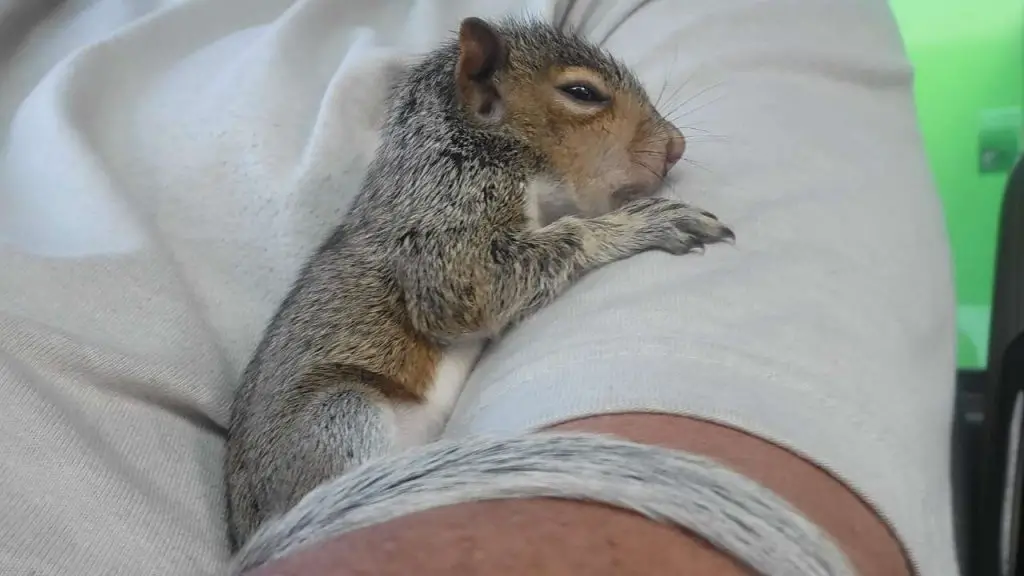
Always Clean Their Cage
Squirrels are usually exposed to environmental threats and can easily fall sick under dirty living conditions.
It is best to clean squirrel cages at least once a week. You can use soap or detergent to clean the walls of the cage and also remove any residual food and fecal matter.
Proper Nutrition
Squirrels need a healthy and balanced diet to stay healthy. When keeping baby squirrels, avoid feeding them with baby squirrel formula or milk (especially human milk that has lactose).
This can lead to death as they need specific vitamins and minerals. It is best to take a baby squirrel to a vet or wildlife rescue to learn how to feed it properly.
Buy Their Food From Trusted Sources
There are some specially designed foods for squirrels and you can get these at your local pet store.
However, there is some states where you are not allowed to keep squirrels as pets. You can then order squirrel food only but it may take a few days before it will be delivered.
Proper Hygiene When Handling/Petting Them
You should always clean your hands before and after handling your squirrel. You can clean your hand with disinfectant to prevent infections.
Quarantine Your Squirrel
Whenever you notice that a squirrel has an infection or could be ill, always try to isolate it from the rest of the squirrel. This will help to prevent the spread of disease from one squirrel to the others.
Encourage Exercise
You need to ensure that your squirrel spends time building his muscles whenever you plan to keep your squirrel for a long time.
You can give your squirrel access to one room of your house at least for an hour a day.
Your squirrel can then climb, run, and play in this room.
Whenever you go outside with your squirrel, ensure it is in a cage with you. This is because hawks and other predators can hunt your squirrel, and if they even escape, they can get spooked and run away to fend for themselves.
Wrapping Up
Squirrels are usually affected by several types of illnesses. However, they can carry diseases for a long time without showing any visible symptoms. Whenever you notice any changes in your squirrel’s appearance and behavior, this can help to indicate that it is not healthy.
The safest method that a pet owner can use to spot a sick squirrel is by taking it to a vet regularly.
